In North Africa General Dwight D Eisenhower assumed command of all Allied armies, including the British Eighth Army. On 13 February Rommel launched a counter-attack in Tunisia, inflicting heavy casualties on the inexperienced American troops at the battle for the Kasserine Pass. Guadalcanal in the Pacific was finally secured by US Marines; and the British “Chindits”, a special raiding force, entered Burma.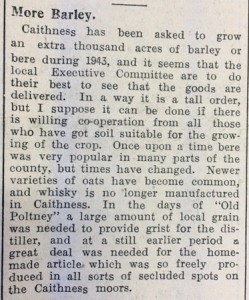
The John O’Groat Journal noted this week that “Caithness has been asked to grow an extra thousand acres of barley or bere during 1943”. (Bere is a strain of barley adapted to growing conditions in the north of Scotland, sown in spring and harvested in summer.) As the paper observed, “In the days of “Old Poltney” a large amount of local grain was needed to provide grist for the distiller”; but Wick had, of course, voted for prohibition in 1922, leading to the closure of the distillery in 1930 – a ban on the sale of alcohol which remained in place until 1947.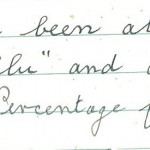
Meanwhile the children of Caithness continued to suffer from winter ailments. This week it was the turn of Killimster School by Wick. The Head Teacher recorded in the school log book, “Six boys have been absent throughout the week with “flu” and attendance has been very low. Percentage for week 69.1.”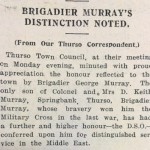
The John O’Groat Journal reported that Thurso Town Council “minuted with proud appreciation the honour reflected to the town by Brigadier George Murray. The only son of Colonel and Mrs D. Keith Murray, Springbank, Thurso, Brigadier Murray, whose bravery won him the Military Cross in the lats war, has had a further and higher honour – the D.S.O. – conferred upon him for distinguished service in the Middle East.”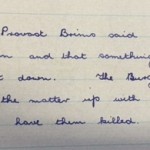
In recent month Wick Town Council had debated the challenge posed by a plague of rats in the town; now it was Thurso’s turn, and the Town Council decided to adopt a no-nonsense approach: “Provost Brims said that there were too many rats in town and that something would have to be done to have them kept down. The Burgh Surveyor was instructed to take the matter up with Mr Coutts, Sanitary Inspector, Wick, to have them killed.”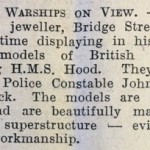
Finally this week, the John O’Groat Journal informed ist readers that “Mr D. Cormack, jeweller, Bridge Street, Wick, is meantime displaying in his window several models of British warships, including H.M.S. Hood. They are the work of Police Constable John Barnetson, Wick. The models are made to scale, and are beautifully made, with detailed superstructure.”
